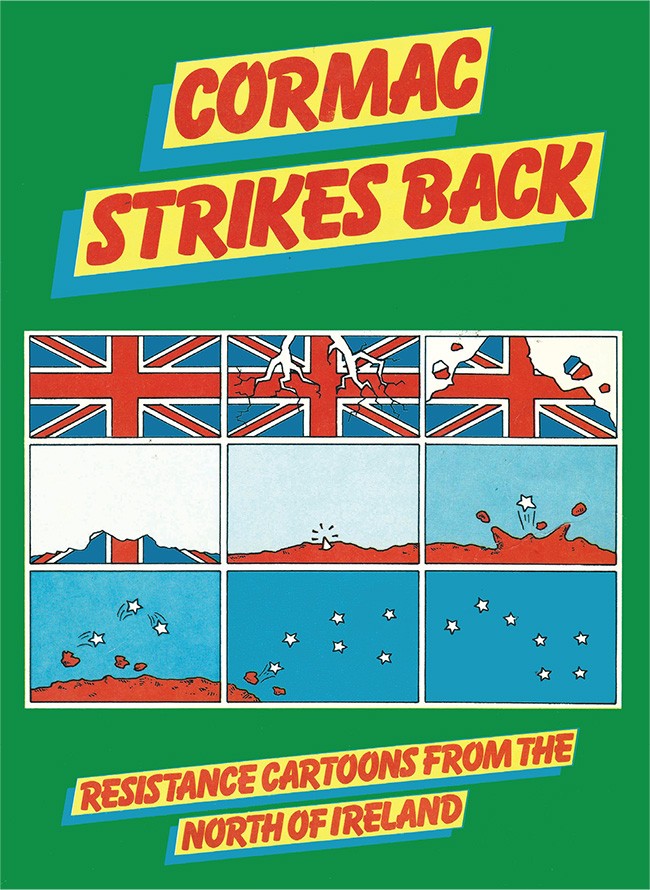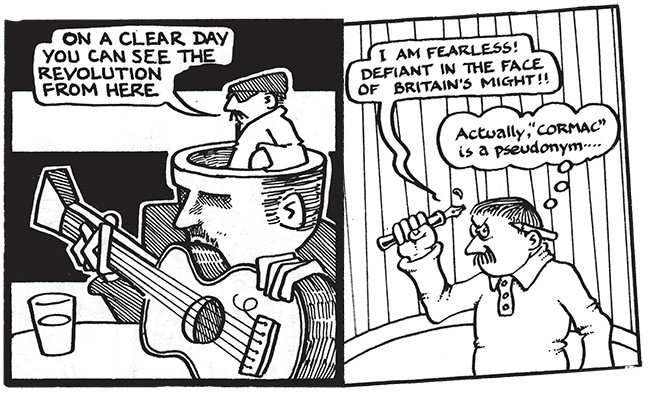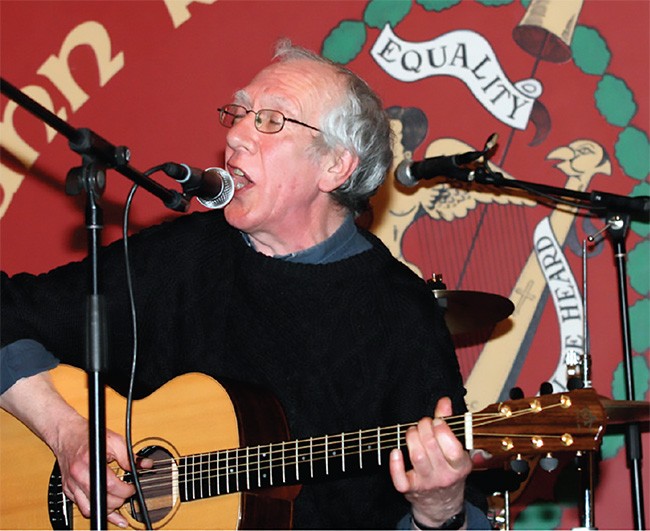1 December 2020 Edition
Cormac strikes back
Remembering Brian Moore, An Phoblacht’s legendary cartoonist

• Brian Moore
An Phoblacht readers still remember Cormac cartoons. They often have favourites and, like me, you probably cut a few out of the paper over the years, as that week’s work was so funny or searingly cutting that you couldn’t let it go. His cartoons featured weekly in An Phoblacht for nearly 30 years.
As one of the writers there, I, like many others, endured all too regular reader taunts that Cormac was the only reason that they bought the paper, other than to read the “war news”. We knew this. We knew what a gem Cormac’s work was.
Cormac was in the same league as the Guardian’s Steve Bell, Garry Trudeau’s Doonesbury or Art Speigelman in the New Yorker. His work and artistic ability lifted us and the paper week in, week out. We wanted to be better to match the irrepressible imagination and ability that Cormac effortlessly demonstrated.
Cormac was in fact Brian Moore, a singing, song-writing folk artist with his own band, the People of No Property. He wrote, songs, plays, and even put together a monologue celebrating Christy Moore called ‘Paddy on the Road’.
In Brian’s An Phoblacht obituary, Peadar Whelan captured the scale of Moore’s song writing talent. He wrote that Brian was “a writer of brilliant political songs and a singer of the highest quality. In the best traditions of Pete Seeger or Bob Dylan, the Moore pen produced protest songs that inspired, raised awareness and, of course, poked fun at the political establishment”.
During his lifetime, there were three Cormac books printed, beginning in 1982 with ‘Cormac Strikes Back’, ‘the Comic Book of MI5’, and finally the ‘Peace Process according to Cormac’. There should have been more.
Brian also created his own short publication called ‘Resistance Comics’ in the 1970s and, under the name Kormski. collaborated in the Dog Collars strip published in Fortnight during the 1980s. His work was also published during the 1970s and ‘80s in the British periodicals Socialist Challenge and Socialist Action.

Speaking after Brian’s death in 2011, former Sinn Féin president Gerry Adams said that, “His weekly contribution to the paper touched on the big issues of the time; the war, repression, sectarianism, collusion, and much more. His cartoons lampooned the British Army and RUC, the British Government, and media. If he witnessed injustice, he turned his satirist’s pen loose”.
Notes by Cormac covered a range of topics; from the conflict, elections, political issues across Ireland, a never ending critique of the intricacies of British imperialism, and, every now and then, the writers and editors of An Phoblacht.
His socialist republican beliefs permeated the years of Cormac cartoons. Moore was relentless in deflating those who sought to marginalise the Belfast community he was part of and he provided stinging rebukes to those politicians who sought to explain away the causes of political conflict in Ireland.

Brian’s cartoon world was a magical place, populated with crazy generals, biased media commentators, sectarian politicians, and luckless British soldiers, often accompanied by the calm reflection of a bystander taking all of this in. And, through humour, Brian raised issues about equality and gender rights that were only beginning to become part of public discourse at the time.
Cormac’s universe was a surreal one, with eerie plants and array of creatures popping out of crevices and holes in the ground, all speaking truths about the reality of life in Ireland.
Two personal favourites of mine are firstly the colour cover of the 1982 ‘Cormac Strikes Back’ book, where the Union Jack splinters, dissolves, and reforms as a Starry Plough flag. Then, there is a standalone frame of a guitarist sitting in front of a half empty glass, his head an open hemisphere, with a small man inside, wearing sunglasses and a flat cap, proclaiming that, “On a clear day, you can see the revolution from here”.
In coming editions of An Phoblacht, we are going to republish some of the classic Cormac cartoons and so bring a new generation of activists to the magic of his work.
Invisible Women

(by Brian Moore)
The singer sings a rebel song
and everybody sings along.
Just one thing I’ll never understand:
Every damn rebel seems to be a man.
For he sings of the Bold Fenian Men
And the Boys of the Old Brigade.
What about the women who stood there too
“When history was made”?
Ireland, Mother Ireland, with your freedom loving sons,
Did your daughters run and hide at the sound of guns?
Or did they have some part in the fight
And why does everybody try to keep them out of sight?
For they sing of the Men of the West
And the Boys of Wexford too.
Were there no women living round those parts;
Tell me, what did they do?




